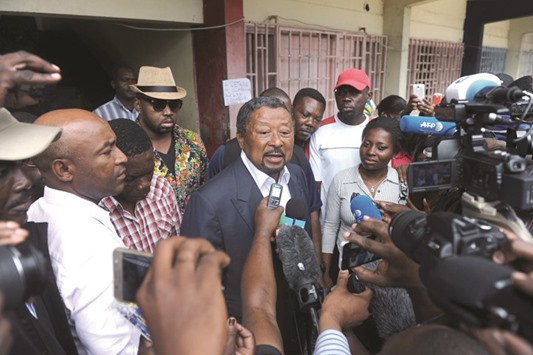The people of Gabon were voting yesterday to either re-elect President Ali Bongo or bring to power a veteran politician riding on a promise to end a 50-year-old family dynasty.
The election in the oil-rich central African country followed an acrimonious campaign and persistent social unrest.
But except for crowds outside polling stations, the streets of the capital, Libreville, were largely deserted yesterday.
Shortly after voting began, the main opposition candidate, former African Union (AU) Commission chief Jean Ping issued a fresh warning that his rival was trying to steal the election.
Ping alleged that a Friday Constitutional Court decision allowed soldiers, who traditionally support Bongo, to “vote several times in several polling centres”.
“We know the other side is trying to cheat. It is up to you to be vigilant,” Ping, 73, told reporters.
“We are preparing to celebrate victory. You know that our opponents have been completely rejected,” said Ping as he cast his vote in Libreville.
Outside a polling station at a school in the capital, there was a mood of defiance.
“Let them try to cheat and they will see what happens!” said one voter.
Claude Richardin, 36, was voting in an election for the first time.
“Elections here have always been fixed but perhaps this one will be transparent,” he said.
“What we want is a change of name, Fifty years of Bongo is too much,” said his friend Fred.
Bongo came to power in a contested election held in 2009, after the death of his father, Omar Bongo, who had been in power for 41 years.
“The best way to get rid of Ali and all his group of hangers-on is via the ballot box and that’s what I’ve done,” said Francoise Mba as she cast her vote in Port Gentil, the second city.
Another voter in the city, a 32-year-old who gave his name only as Steve, said he had voted against Ping’s “fake opposition which has no plans for the country”.
The president said yesterday that he was “calm”.
“I had a good night,” said the 57-year-old dressed in a light-blue shirt and dark blue jacket.
Noting the presence of more than 1,000 Gabonese and foreign observers, Interior Minister Pacome Moubelet Boubeya said in a statement that “everything is in place to guarantee a transparent and impartial election”.
However, Bongo’s spokesman, Alain-Claude Bilie-By-Nze, alleged that some of Ping’s supporters in one district of the capital had prevented voters from casting their ballots.
Campaigning was marked by months of bitter exchanges, including accusations, and strenuous denials, that Bongo was born in Nigeria and therefore ineligible to run.
On Friday, each side accused the other of buying up voter cards in various parts of the country.
Until recently, Bongo was the clear favourite, with several prominent politicians running against him and splitting the opposition.
But protracted negotiations led key challengers to pull out and back Ping, with the last of them withdrawing only last week.
Both candidates based their campaigns around a promise to break with the past.
Faced with repeated charges of nepotism, Bongo has long insisted that he owes his presidency to merit and his years of government service.
His extravagant campaign made much of the slogan “Let’s change together”, playing up the roads and hospitals built during his first term.
In an overt jibe at Ping’s own long association with his father, Bongo also stressed the need to move on from the bad old days of disappearing public funds and dodgy management of oil revenues.
“There’s a risk that certain people who did so much harm to our country will come back” to power, the president told a crowd of thousands during his last rally in the capital on Friday.
As well as having spent many years working for the Bongos, Ping also has close family ties to the powerful dynasty: he was formerly married to Omar Bongo’s eldest daughter with whom he had two children.
One-third of Gabon’s population lives in poverty, despite the country boasting one of Africa’s highest per capita incomes at $8,300 thanks to pumping 200,000 barrels of oil a day.
Youth unemployment is at 35%.
Results of the poll are expected within 72 hours of the polls closing at 1800 GMT.

Ping speaks with journalists at the Martine Oulabou school in Libreville.
